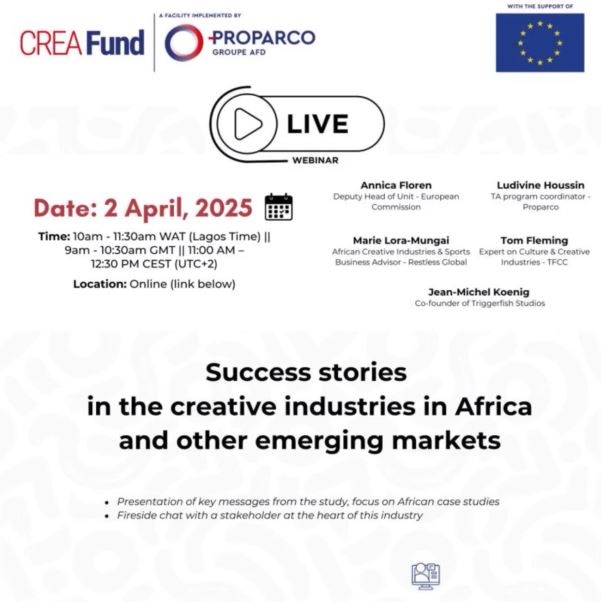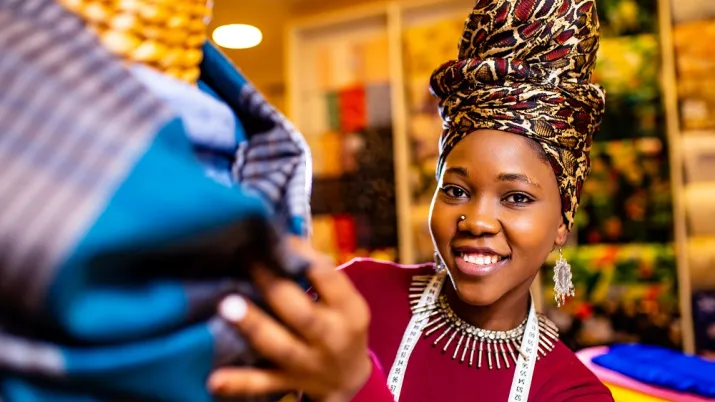Share the page
Supporting cultural and creative industries: interview with Annica Floren from the European Commission and Manal Tabet from Proparco
Published on

At a time when Africa, the Caribbean, and the Pacific are brimming with creative talent yet face persistent obstacles in accessing financing, the European Union and Proparco have joined forces to tackle this challenge through the CreatiFI programme (The Cultural and Creative Industries Financing Initiative). In this joint interview, Annica Floren (European Commission) and Manal Tabet (Proparco) explain how these new financial instruments aim to transform the landscape of cultural and creative industries (CCI) in sub-Saharan Africa.
Through innovative guarantees, technical assistance, and synergies with the Global Gateway strategy, Annica Floren, Deputy Head of Youth, Education, Culture Unit at the European Commission, and Manal Tabet, Deputy Head of the Technical Assistance & Blending Unit at Proparco, reveal the ambitions of a scheme designed to stimulate investment, support employment, and catalyze inclusive growth within a sector buzzing with activity and innovation.
Could you explain how the CreatiFI programme, and particularly the CREA Fund managed by Proparco, aligns with the EU’s Global Gateway Strategy? Additionally, how does it complement other EU-funded cultural initiatives for Sub-Saharan Africa?
Annica Floren: The EU’s Global Gateway strategy supports sustainable development by building strong partnerships worldwide. Through creativity, technology, and sustainability, cultural and creative industries (CCIs) play a big role in this mission, helping create jobs, boost innovation, and open new markets. The CreatiFI programme (€20M) backs this by improving access to finance for small businesses and creative projects in Africa, the Caribbean, and the Pacific. It strengthens local financial systems and helps CCIs grow and connect with investors.
CreatiFI works alongside other EU initiatives (€75M total), like the Africa Europe Partnerships for Culture and new support for the audiovisual sector, creating exciting opportunities for collaboration and growth across the continents.
How does CreatiFI's financial instrument model address the historic underfunding of the African CCIs sector?
Annica Floren: Investing in Africa’s creative sector isn’t easy, many financial institutions don’t fully understand the industry, and creative entrepreneurs often face challenges with business know-how. That’s where the CreatiFI programme comes in. It helps bridge this gap by offering tailored support, business training, and risk-reducing guarantees to attract both local and international investors.
With three action areas carried out by our like-minded partners Proparco, the African Development Bank and the World Bank, CreatiFI boosts finance, skills, and market access for cultural and creative industries across the region. It’s a tailored approach, designed to unlock real growth and investment in Africa’s creative economy.
How does it combine with CreatiFI’s focus on scalable financial instruments for CCIs?
Manal Tabet: With mechanisms such as CreatiFI, which allow us to combine investment, guarantees, and grants, it is possible to diversify and expand Proparco’s portfolio of support instruments to the private sector’s role as an accelerator of transitions. For example, EU guarantees enable us to encourage investments in companies that typically face significant challenges in raising funds, whether due to their size, geographic focus, sector, or non-traditional business model, as is often the case in the Cultural and Creative Industries.
Projects with high impact potential, like CREA Fund, exemplify where blending mechanisms, and thus partnerships between organizations such as Proparco and the EU, make the most sense: they provide greater “additionality” and amplify the impact of private financing by supporting sectors that generate broad social and economic benefits.
Could you elaborate on CREA Fund’s mechanism: guarantees to de-risk investments and technical assistance (TA) components?
Manal Tabet: CREA Fund, standing for Creative Enterprise Action Fund, is a pilot initiative implemented by Proparco. It is aimed at raising awareness among financial institutions in Sub-Saharan Africa and the Caribbean about the potential of Cultural and Creative companies – as a business in need of financing and investment, but also as a sector with strong social and cultural impact: By improving access to finance for cultural industries, CREA Fund will foster the growth of SMEs that, while often built on intangible assets and unconventional business models, play a vital role in promoting social cohesion, spreading knowledge and culture, enhancing local development, and generating employment, particularly for women and young people.
CREA Fund is composed of:
- A guarantee of 5 million Euros, intended to cover the investments that financial institutions (mainly Investment Funds), client of Proparco, may make in companies within the creative sector;
- A Technical Assistance with a budget of 1.47 million Euros, dedicated to support financial intermediaries in better understanding the specificities of the Cultural and Creative Industries (notably through dedicated market studies, training sessions, or access to sector-specific expertise) and/or to support the growth of the companies they wish to finance.
Both instruments are complementary to unlock financing in the sector.
Technical assistance component includes market studies and capacity-building. How do you tailor these services to bridge the gap between financial institutions’ risk perception and CCIs’ need for patient capital?
Manal Tabet: The first phase of the project allowed us to establish an initial catalogue of potential capacity building activities. This catalogue, based on the results of a client survey, reflects the main needs expressed by the investor community to consider investing in CCI companies. While not exhaustive, it offers an initial roadmap of potentially useful activities for our clients and prospective partners in the CCI sectors for their portfolios – a support that we are now ready to offer to our clients.
We have also carried out investigations to better understand the challenges and constraints of CCI financing today and to highlight concrete projects that have been successfully launched – investigations summarised in two market studies which are accessible for all on our website (see below).
What other levers are needed to attract more financial institutions into Africa's and the Caribbean's CCI market?
Annica Floren: Africa, the Caribbean, and the Pacific (ACP) have incredible creative talent, but turning that into thriving businesses needs the right support. That’s why the EU is investing in tools to reduce risks for banks and investors, like guarantee schemes and sector-specific funds, while also building stronger public-private partnerships. The largest of these, the EFSD+ (European Fund for Sustainable Development Plus, a €40 billion EU initiative) also offers support to small businesses, including those in the creative sectors.
To help creatives grow, the EU backs training and technical assistance through CreatiFI, helping entrepreneurs build business skills and helping banks better understand the creative industry. We’re also launching a new €15M programme to support film, gaming, and virtual reality in Sub-Saharan Africa, plus we’re boosting policy work through the EU-UNESCO Expert Facility—because clear rules help everyone invest with confidence.
Manal Tabet: The CREA Fund is part of the broader offering by the AFD Group to support the CCI sector, which also includes support for public policies, the development of cultural infrastructure and facilities, the promotion of entrepreneurship, and capacity building for sector professionals. With the CREA Fund, Proparco adds a new component to the continuum of financing for CCIs, aiming to encourage private equity funds to consider these often informal, small, and early-stage companies, which, with the adoption of digital technologies, have significant potential to scale up.
Early-stage CCIs are also eligible for support from Proparco’s subsidiary, Digital Africa, which invests directly in innovative startups, focusing its efforts on ecosystems underserved by traditional investors. Therefore, the CREA Fund should be seen as a new step in strengthening our offering to the CCI sector. It is a strength of the AFD Group to be able to act on different levers that contribute to economic and social transformation.
Discover the studies
Replay webinar: "Success Stories in the Creative Industries in Africa and Other Emerging Markets"
Published on April 29, 2025
Report - Success Stories in the Creative Industries in Africa and other Emerging Markets
Published on April 2, 2025
Report - Access to Finance for the Film Industry in the Dominican Republic and Jamaica
Published on April 2, 2025



